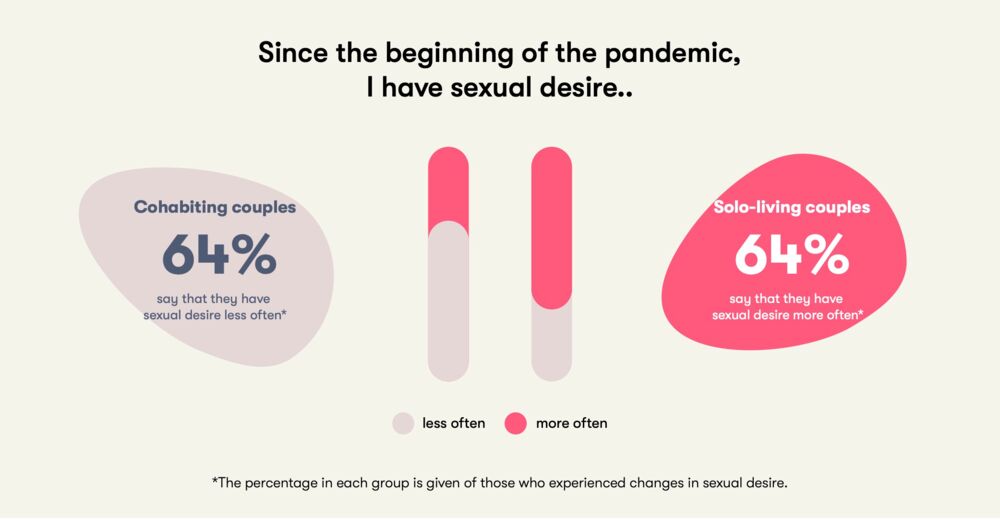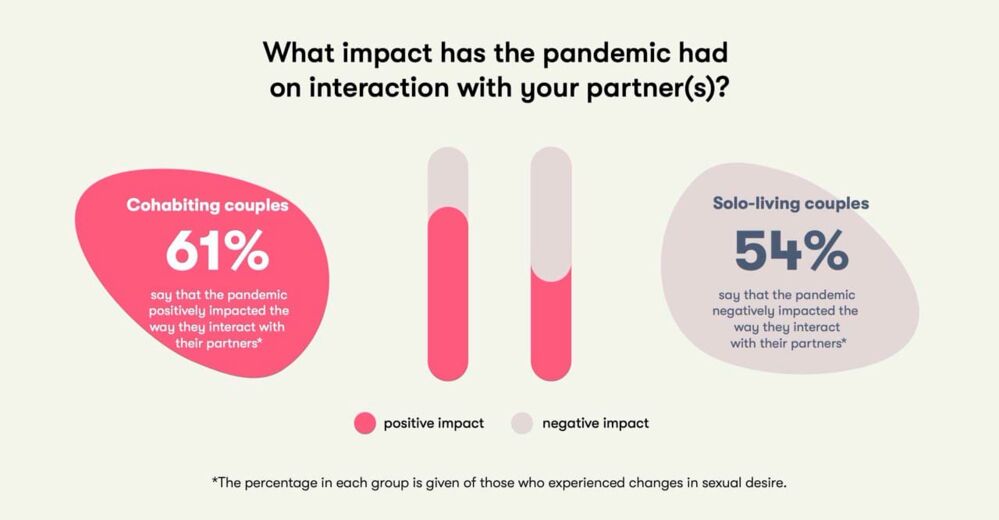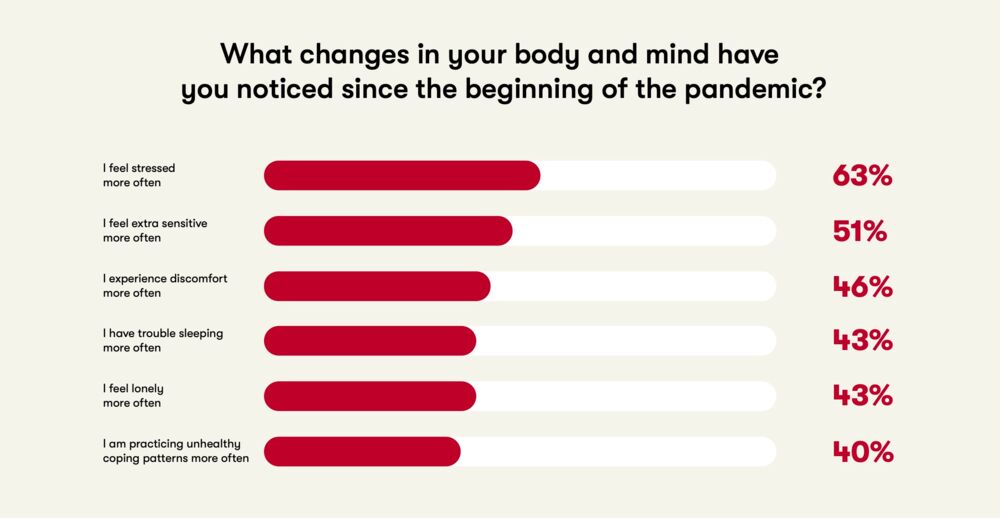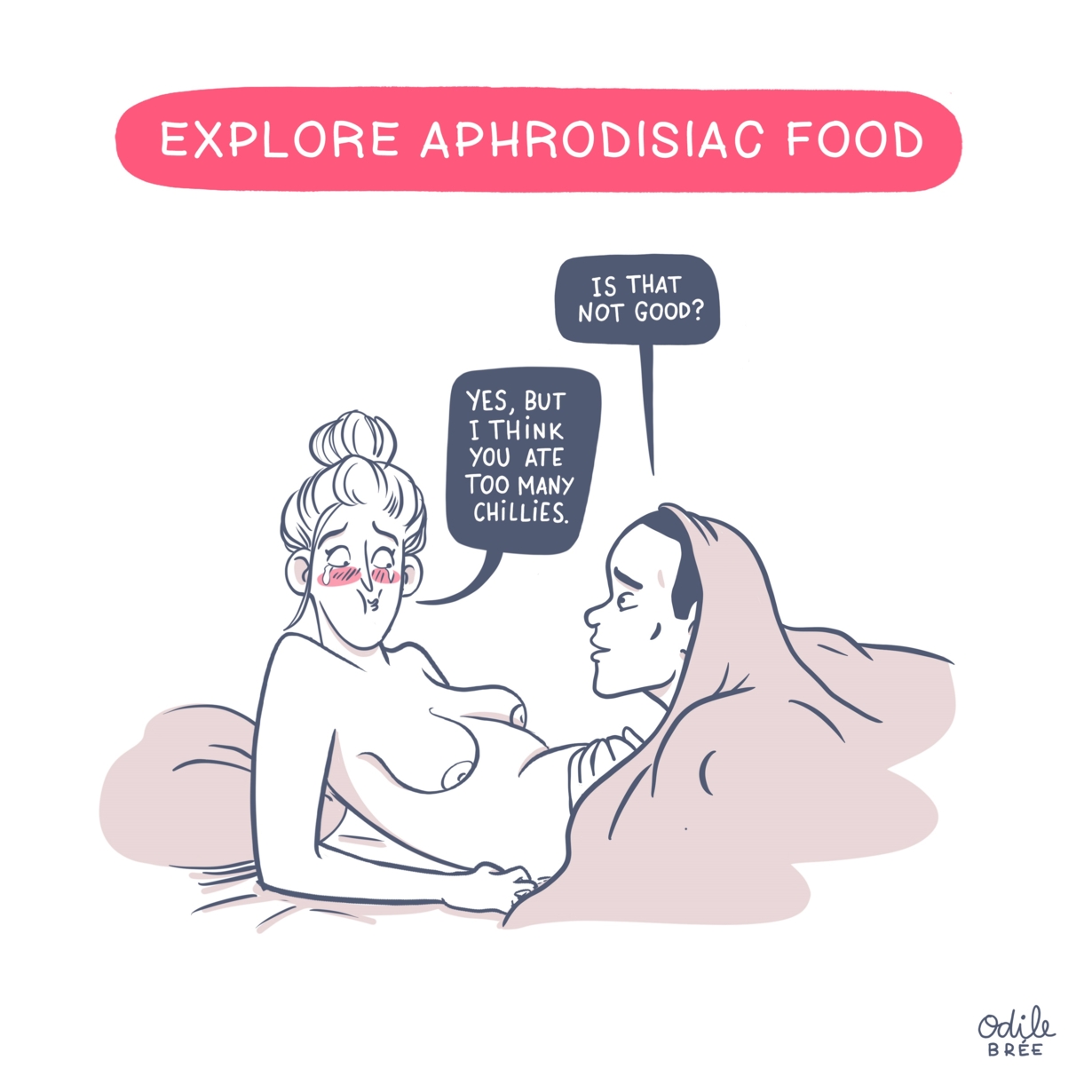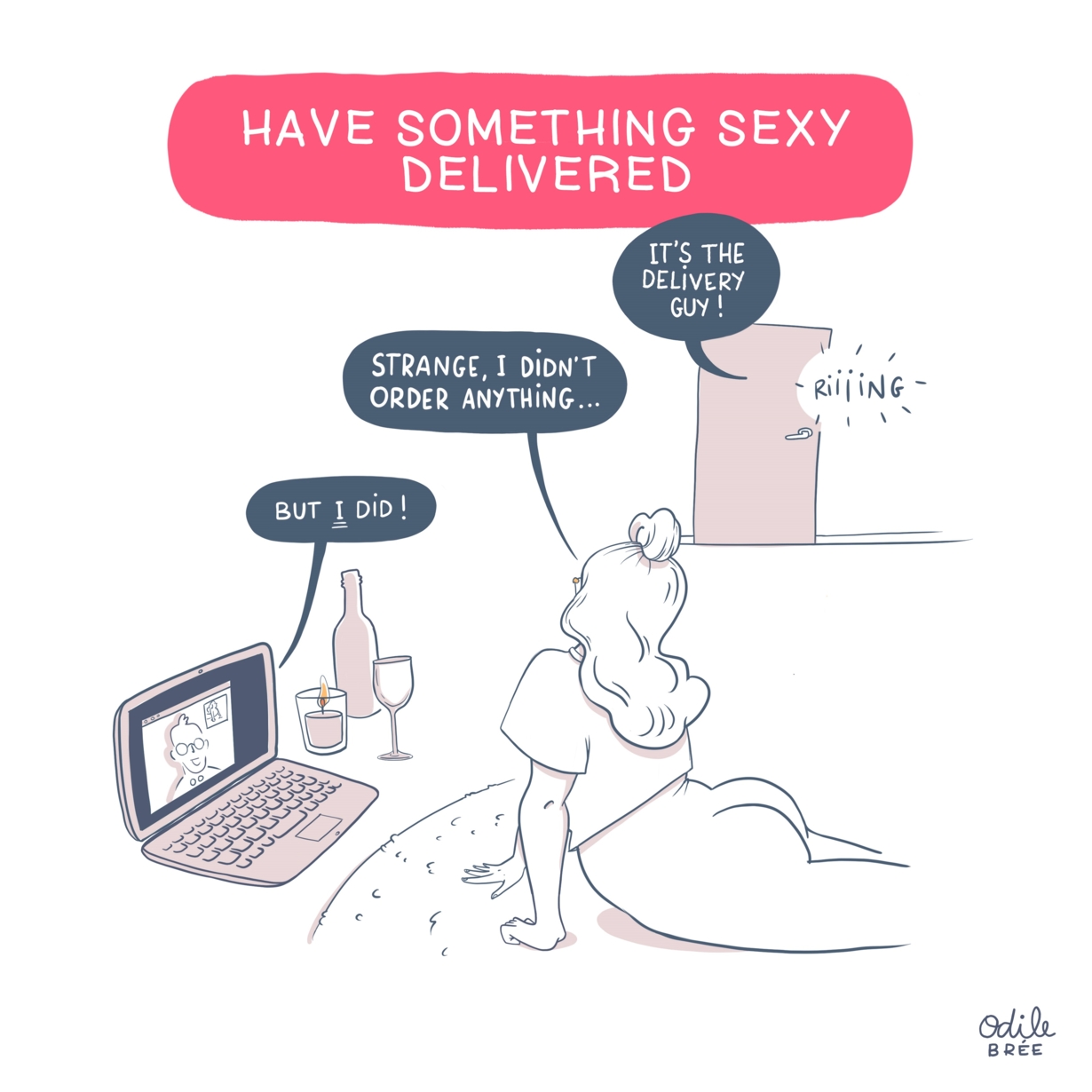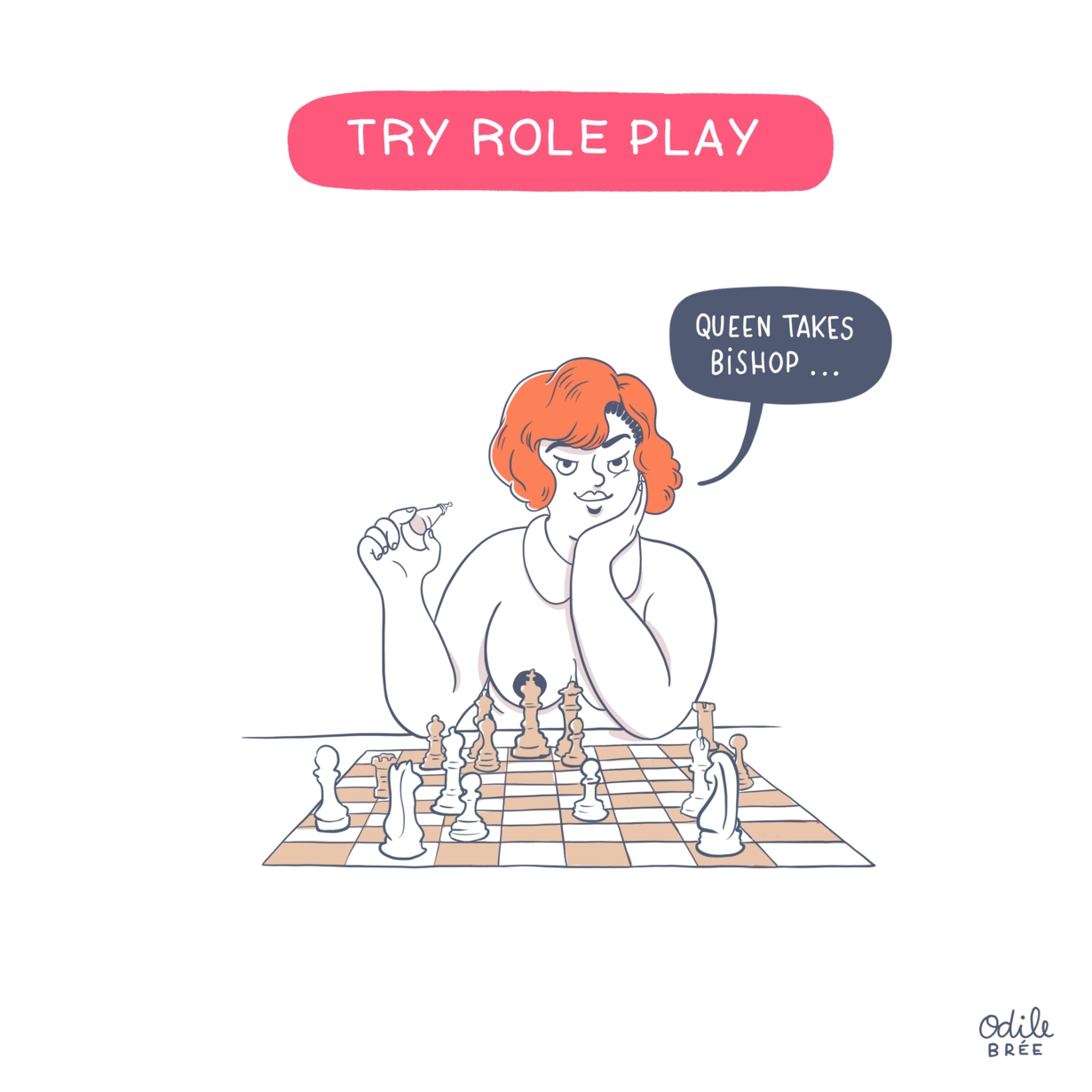Let’s face it: the pandemic has taken a considerable toll on every aspect of our lives — especially our relationships. In our recent “Love, Sex, & Lockdown” survey, nearly 3,500 women shared how the pandemic has impacted their sexual desire, partner interactions, and overall mental and emotional well-being.
Distance keeps the fire burning
According to the survey, 64% of women who experienced changes in their sex life while living under the same roof with their partner said that they experienced a decrease in sexual desire. Of this subset, 64% said they experienced a decline in the quality of their sex life, and 57% said that they orgasm less often.
We spoke with Flo Medical Board member and sex therapist, Dr. Jordan Rullo, PhD, to hear why this may be. According to Dr. Rullo, there’s fortunately no need to be alarmed.
“One driver of sexual desire is novelty, newness. For couples living together, the pandemic may have brought an extreme togetherness with their partner that has taken away the novelty of their sexual relationship. The monotony of the pandemic hits the brake pedal of desire for many women,” said Dr. Rullo.
The results of the survey may point to the idea that a healthy bit of mystery and distance fuels desire. Among women who are living separately from their partner and experienced changes, 64% said their sexual desire had improved.
“Sexual tension may lead to couples to getting more creative in the ways they sexually connect, like cyber sex.”
Among this subset, 46% said they feel the quality of their sex life has improved, 44% orgasm more often, and 42% have healthy sexual self-esteem more often.
Dr. Rullo concluded that increased sexual creativity and novelty are key ingredients to increase sexual desire.
The secret to sustainable love? Communication
Contrary to popular belief, among the couples who experienced changes in their relationship while living together, 61% say that the pandemic has positively impacted their relationship.
“Couples who used to spend most of their days separated from each other are now spending more time than ever before together.”
“There’s time to grab a quick lunch together, take a mid-day walk together, and get “home” from work sooner without a commute. It’s not surprising that couples who are using this increased time together in a positive way are feeling more positive impacts in their relationship..” The survey backs up this theory. Among this subset, 68% support each other more often, 67% spend more quality time together, and 61% have meaningful conversations with their partners more often.
The pandemic had a different effect on couples living apart. Approximately every other woman who experienced changes said that the pandemic negatively impacted the way they interact with their partners. “For couples who do not live together and haven’t been dating very long, the pandemic may be one of their first major relationship hurdles,” said Dr. Rullo. “New couples are learning to support each other through these tough times, in addition to negotiating how to stay safe in a pandemic. These are advanced skills for new couples and those early on in their relationship may be having difficulty navigating these issues.”
Among this subset, 42% of women say they experience conflict more often with their partners, 41% spend less quality time together, and 38% of women say they feel irritated by their partner more often.
“For couples who do not live together, but have been together for a long time, presumably these couples have created a schedule to stay connected in-person. For example, maybe they take turns to fly out to see each other every month. With the pandemic, these cross-country trips are more difficult to take, and they may feel like they are slowing drifting apart without having that in-person connection,” explained Dr. Rullo.
Increased stress & sensitivity calls for more self-love and self-care
When asked about their mental and emotional well-being, women who responded expressed that they’re feeling more stressed (63%), sensitive (51%), lonely (43%), and experience increased sleep troubles (43%) and unhealthy coping patterns (40%). Fortunately, there’s still hope when it comes to improving sexual desire under these circumstances!
“Think of these issues as hitting the brake pedal of desire. If stress is on your brake pedal, consider exercising on a consistent basis or daily meditation. If sleep has worsened, seek out solutions to improve your sleep hygiene. To boost your desire, try to take as much off the brake pedal as possible, and from there, add things to the gas pedal. Dress up to pick up take-out food or for your nightly zoom date!” Dr. Rullo suggests.
Love lessons for the future
It’s safe to say that there will be lessons learned about many things during this time — including relationships with others and the relationship we have with ourselves. When asked about the lessons they have learned regarding their relationship with their partner, many respondents highlighted the importance of talking with each other, listening more, asking more questions, communicating feelings, and not keeping things internalized. When asked about key lessons learned regarding their relationship with themselves, many women noted the importance of loving yourself more, taking more “me time,” and balancing work and life.
Tips to boost desire
At Flo, we are committed to supporting our users with evidence-based sexual health information and try our best to make sure everyone gets to know their sexual desires, understands their bodies, and has the amazing sex they deserve!
To spice things up this Valentine’s Day, we’ve prepared a little set of 6 playful cards, made by the talented illustrator Odile Bree, that are meant to spark your imagination. Whether you spend the day with your partner or apart, you can use these cards as a game or save them for later.
Don’t miss free access to our course, “Sex Ed for Grownups,” led by Dr. Laura Berman, a sex and relationship therapist and sexual health educator and advocate. Find the course in the insights section of the app, available now for free until the end of February (English only). If you have the Flo app, watch the course here or download Flo to access here.
Note: The external survey polled a random, de-identified set of 3,435 self-identifying U.S.-based women ages 18–55 and took place throughout January 2021 via an external survey platform. All survey participants consented to their responses being collected and shared as part of the study. Depending on the analysis, certain subsets of the population were used.
